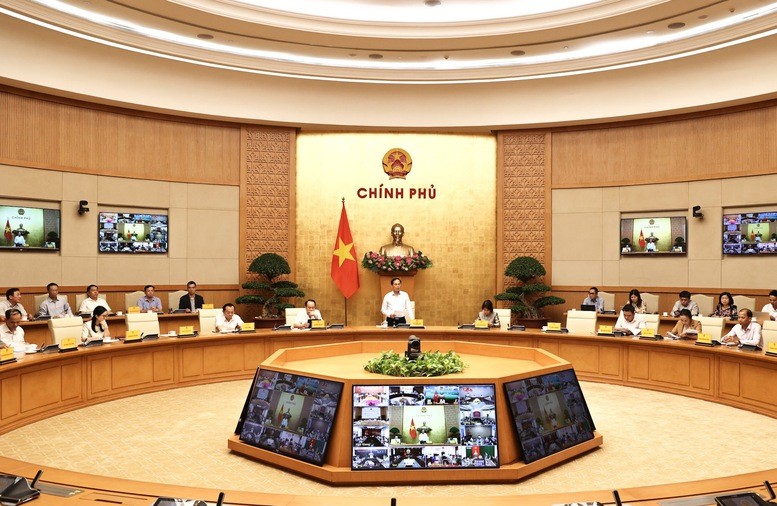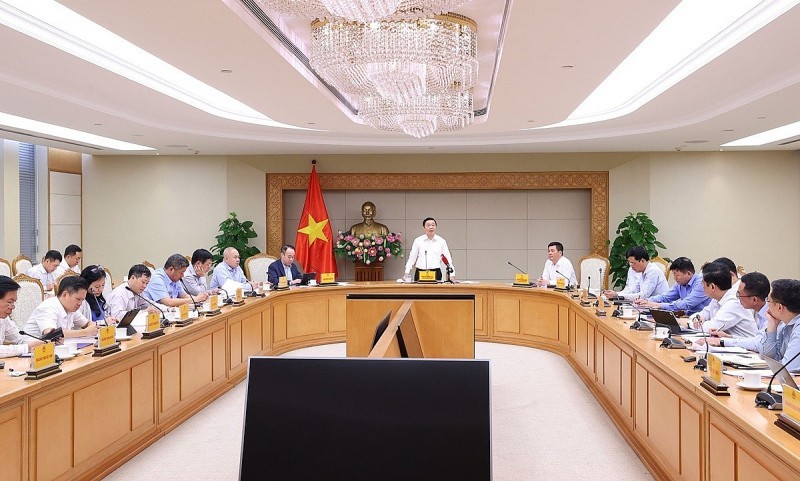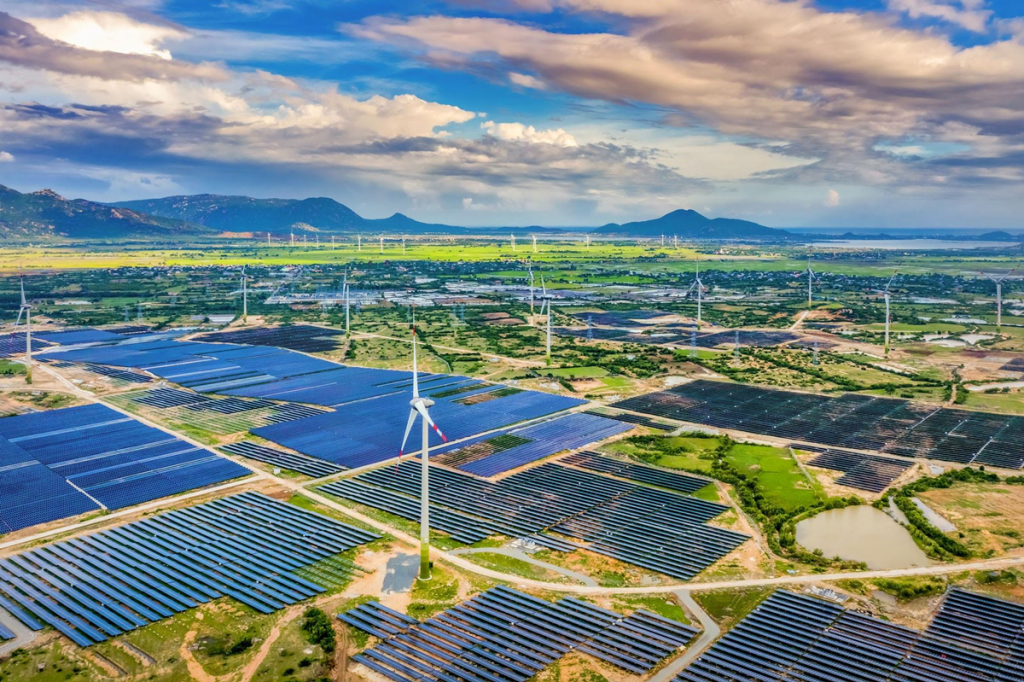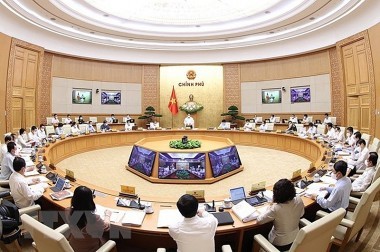The Power Development Planning VIII - Discussing to clarify challenges and suggesting mechanisms and policies
13:15 | 23/08/2023
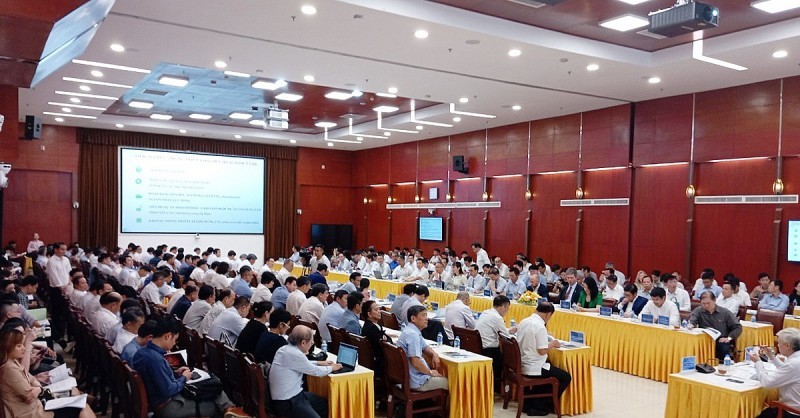 |
| Overview of the Workshop |
The workshop was divided into three sessions: the first session: Identifying challenges for power plant and grid investors; the second session: the important and prior projects, policies and solutions for the State to implement and the third session: the policies and solutions on capitals, technologies and service supply chains.
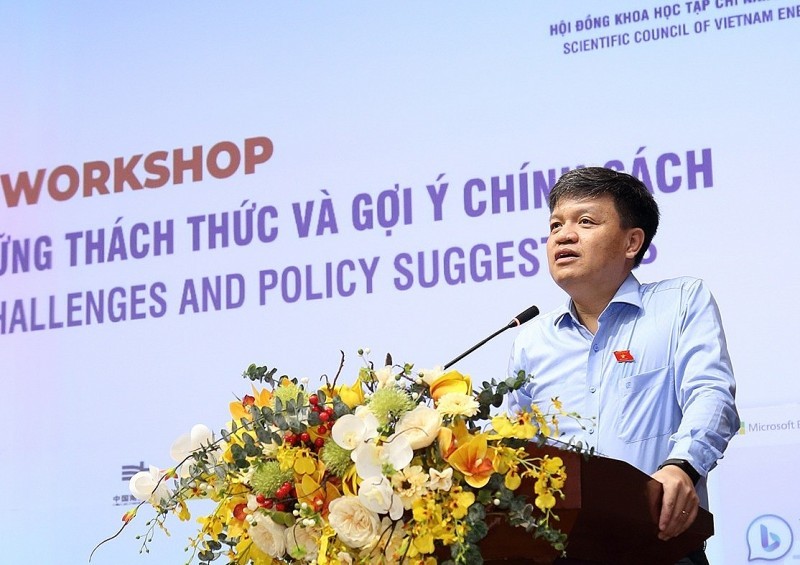 |
| Mr. Ta Dinh Thi - Vice Chairman of the Committee on Science, Technology and Environment of the National Assembly stated in the Opening speech |
In the opening speech, Mr. Ta Dinh Thi - Vice Chairman of the Committee on Science, Technology and Environment of the National Assembly stated the targets of the workshop for making suggestions on policies and laws for the Oversight Team on “implementing policies and laws on energy development in 2016-2021period of the National Assembly. It is also an opportunity for stakeholders to discuss difficulties, challenges and contributions and proposals for implementing PDP VIII.
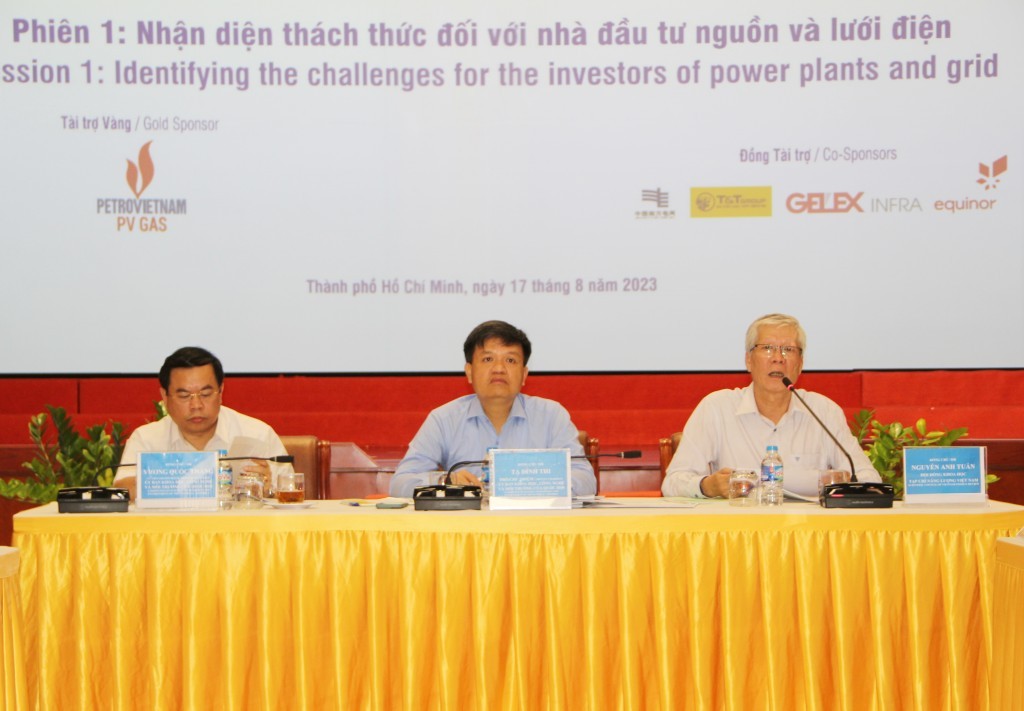 |
| The Presidium runs the Workshop |
Mr. Nguyen Anh Tuan - A permanent member of the Scientific Council of Vietnam Energy Review reviewed the difficulties in implementing PDP VII and PDP VII (adjusted) that have 4 projects/project chains including Long Phu 1 coal thermal power plant, Son MY LNG-Power chain, O Mon Block B Gas –Power Chain and Ca Voi Xanh Gas –Power Chain with a total capacity of 12.600 MW, equal to 20 % of thermal power plants in 2030 and 37 % of the thermal power plants constructed in 2021-2030 period.
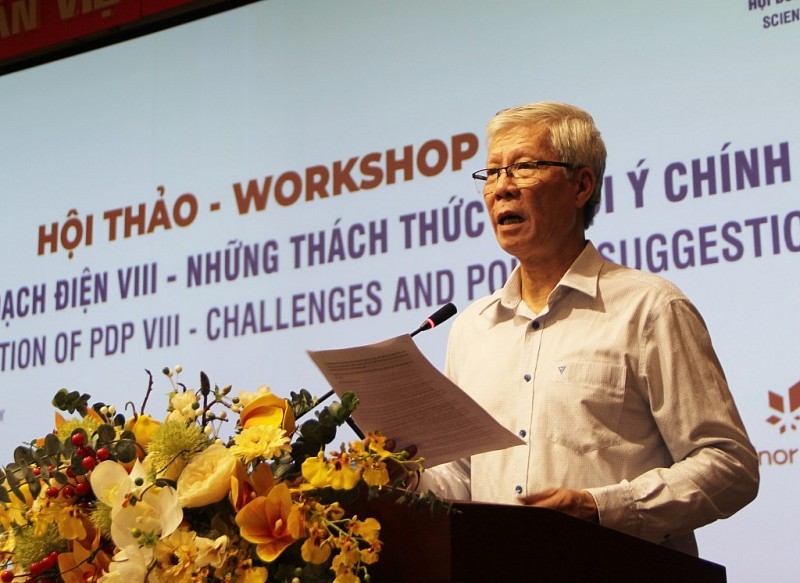 |
| Mr. Nguyen Anh Tuan - A permanent member of the Scientific Council of Vietnam Energy Review |
The Committee on Science, Technology and Environment of the National Assembly and the Scientific Council of Vietnam Energy Review stated that all of the above projects face problems by policy mechanisms, or by subjective in the implementation process. What is the cause of the delay and how can they be removed? Also in PDP VIII, is it possible to develop up to 22,400 MW of LNG power projects from now to 2030? While only 2 projects (with a total capacity of about 2,800 MW) have started, but have not yet signed a power purchase agreement (PPA) with EVN. Are these problems mainly stemming from the provisions of the current policy mechanism, or are there any other reasons?
As for the wind power projects by 2030, up to 27,880 MW (including 6,000 MW of offshore wind power projects) will also be a big challenge, when currently, a total of wind power projects with more than 4,000 MW has been put into operation.
The distribution of capacity of wind power projects by the localities for ensuring the harmony between the needs and technical conditions of the whole system with the needs of localities, thereby selecting investors to develop the project will not be an easy problem.
So in order to effectively implement PDP VIII, is it necessary to supplement and complete current policies and laws? What mechanism lacks implementation? Is there a need for specific mechanisms and policies? How will the plan for each phase up to 2030 be made? What will be the role of the National Assembly, industry management agencies, as well as the role of enterprises participating in investment? etc...
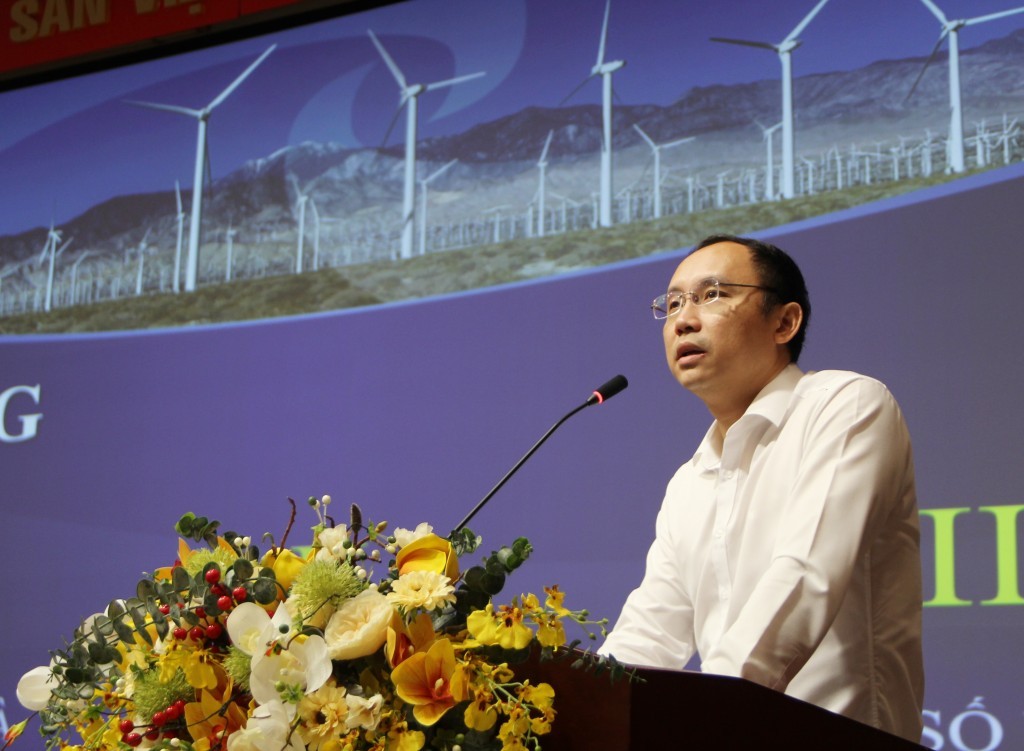 |
| Mr. Hoang Dang Khoa, a representative of the Department of Electricity and Renewable Energy (Ministry of Industry and Trade) gave a presentation on the Challenges in implementing Power Master Plan VIII to 2030 and some comments |
The Representative of the Department of Electricity and Renewable Energy (Ministry of Industry and Trade), Mr. Hoang Dang Khoa explained more clearly the successful development of Vietnam's electricity industry, with the planning in the right direction and pretty good compliance, however, the discipline to implement recent PDPs, as PDP VII and PDP VII (adjusted). Many projects have been planned, but locality rejected, or have been implemented but behind schedule.
PDP VIII with the GDP growth rate scenario of 7 %/year leads to an electricity demand increase of 8.8 %/year. The load peak will reach Pmax 90.5 GW by 2030 which requires 150 GW for a total capacity of power plants. At the same time, Vietnam must make very harsh Net Zero and equitable energy transition (JETP) commitments. The set goal will ensure a safe and reliable power supply for meeting the criteria N-1 for important load areas and N-2 for unusually important load areas.
Implementing PDP VIII requires an average capital of 13.5 billion USD/year with 12 billion USD for power plants and 1.5 billion USD for the power grid. EVN and other companies have difficulty mobilizing capital for large projects. The domestic banks also already exceeded credit limits for power projects. The remaining time for implementing PDP VIII is not much. Implementing the projects in PDP VIII is extremely urgent. Therefore, the Department of Electricity and Renewable Energy proposed the Prime Minister to consider and decide to establish a State Steering Committee for important national and key energy projects and work.
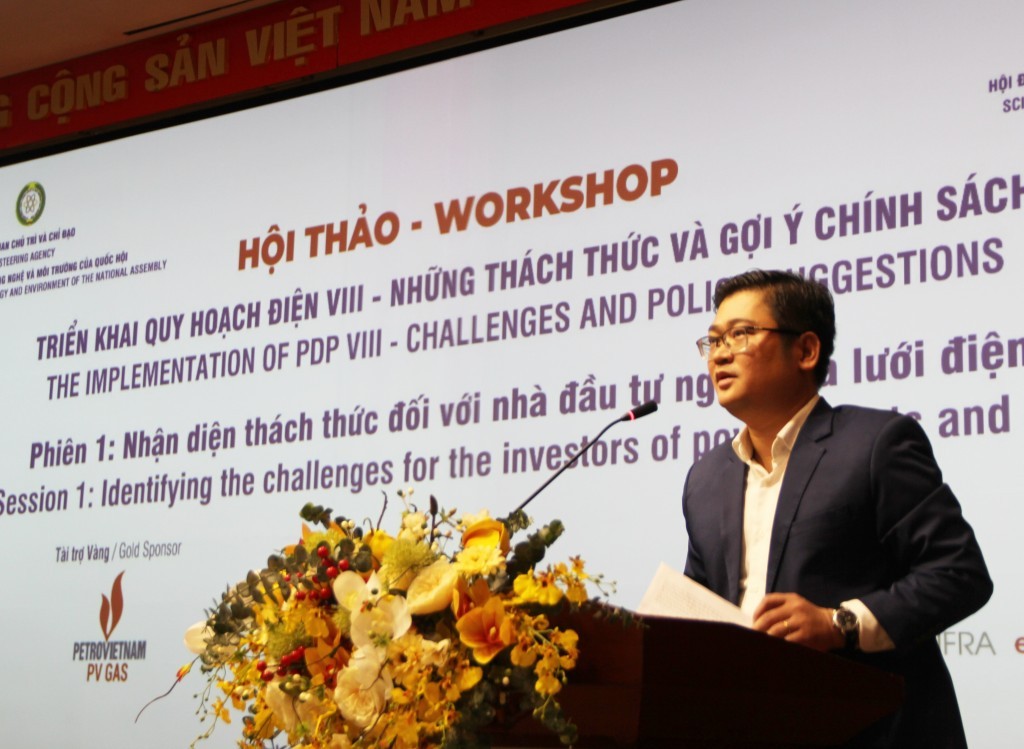 |
| Mr. Tran Anh Khoa - In charge of the Source and Market Development Department (PV Gas) gave a presentation on Power Planning VIII - Roles, opportunities and Challenges for PV GAS. |
Vietnam Gas Corporation (PV GAS) considered deeper into the LNG-power projects in PDP VIII. The PV Gas considered that we must promote the development of renewable energy, but must ensure that it is suitable with the absorption capacity of the system, transmission capacity, and reasonable prices. Therefore, it is necessary to develop domestic gas thermal power, and import and store LNG. The structure of domestic gas and LNG thermal power plants by 2030 will reach 37,330 MW, equivalent to 24.8% of the total power capacity, accounting for the largest proportion in the power plant structure.
Mr. Tran Anh Khoa, a representative of PV GAS, said that the LNG power projects will play a huge role in PDP VIII thank to their ability to reduce CO2 emissions and other pollutants. But implementing infrastructure and LNG power projects is very difficult. Specifically, at present, we still do not have an LNG power price framework and no price transition mechanism. On the other hand, for LNG import infrastructure we have almost nothing but the small port and warehouse of PV Gas. Therefore, Vietnam PV GAS Vietnam needs to focus on purchasing and gasifying LNG at the major clues instead of having 15 ports, warehouses and gasification infrastructures for 15 LNG power plants in PDPl VIII.
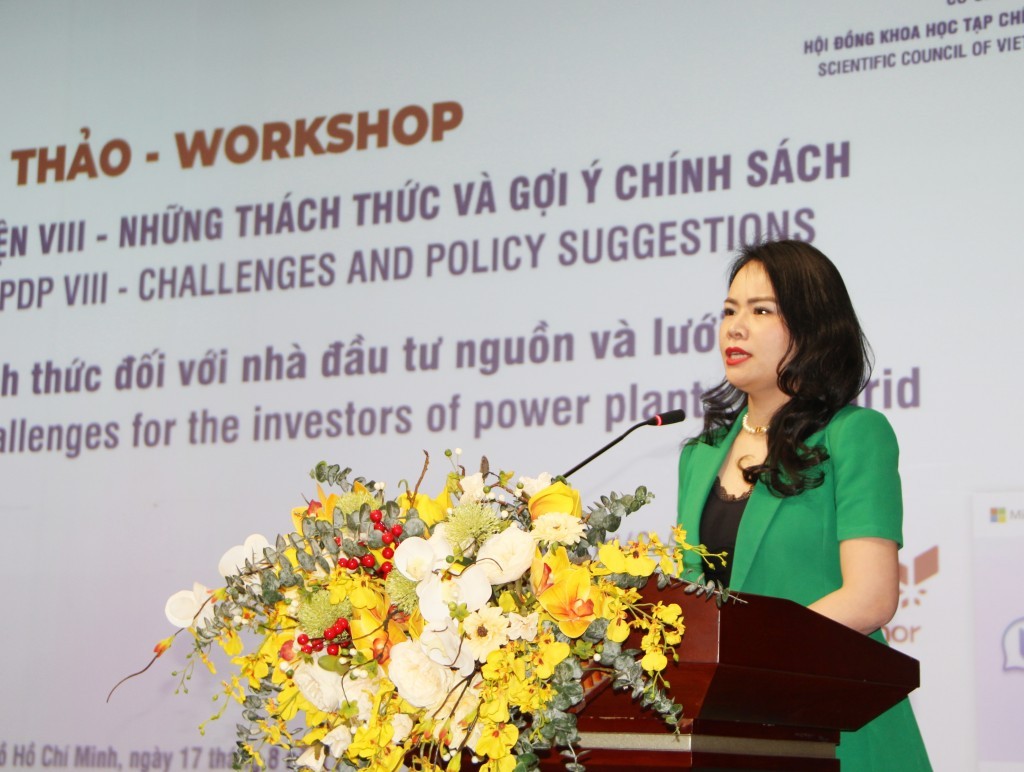 |
| Ms. Nguyen Thi Thanh Binh - Deputy General Director of T&T Group gave a presentation on Policy Problems and Difficulties in Implementing Power Planning VIII - Proposals and Recommendations. |
Ms. Nguyen Thi Thanh Binh - Deputy General Director of T&T Group - a leading private group in Vietnam investing in renewable energy (RE) mentioned a series of difficulties that the enterprises are facing: as the electricity framework of prices for RE is not available, the transitional framework of prices is much lower than the FIT prices.
In addition, to abolish the 20-year fixed-price agreement and monopoly sales of all output commitment, and not commit to the minimum output that EVN must buy. The question posed by T&T Group is what mechanism prices for the upcoming projects? At present, the mechanism for the participation of the privates in transmission is not clear and regulations on direct power purchase agreements (DPPA) are not yet in place.
“The reality shows that the North is weaker in RE potential (wind, solar power) if the price is uniform, it will be adverse for investors in the North, while the North lacks electricity. Therefore, there should be separate electricity price frameworks for each region. And granting carbon certificates for renewable energy can be a way to increase income for investors in these energy projects "- Ms. Nguyen Thi Thanh Binh stated.
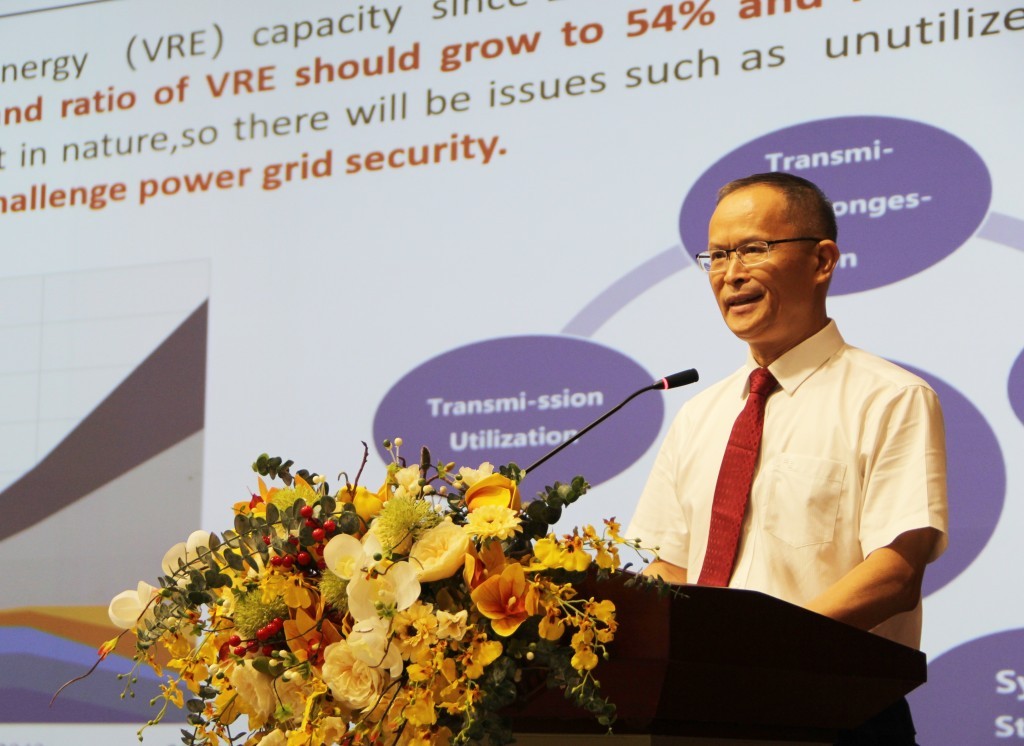 |
| Mr. Guo Haifeng - an Expert group member of China Southern Power Grid Co., Ltd cum Deputy General Director of Namtha 1 Laos Electricity Co., Ltd. gave a presentation on the Solutions to enhance security and Flexibility for Vietnam's electricity system in PDP VIII. |
China Southern Power Grid International Co., Ltd (CSG) is very interested in Vietnam's power system, so at this workshop, CSG has shared experiences, proposed cooperation and is ready to invest
Mr. Guo Haifeng - a Member of the expert team of China Southern Power Grid Co., Ltd (also Deputy General Director of Namtha 1 of Lao Electricity Co., Ltd.) said that China has continuously reformed electricity prices from 2014 to the present, and applied two-price electricity (capacity price and energy price). As a result, the hydropower pump storage has developed strongly. CSG considers the need for power, battery storage, or hydropower pump storage and transmission, including high voltage direct currency (HVDC) is completely new in Vietnam.
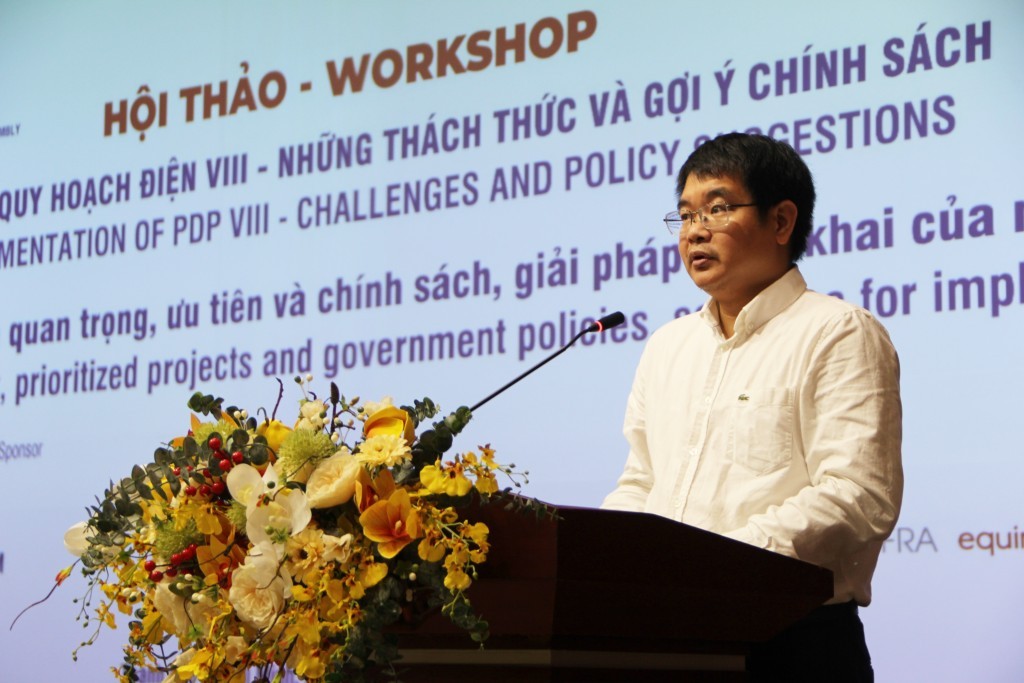 |
| Mr. Nguyen Anh Tu - Electricity of Vietnam gave a presentation on the Implementation of assigned power projects - difficulties, obstacles and propose solutions to promote power projects. |
EVN's speech made clearer the power system, context, and thinking of PDP VIII, scenarios and targets set for 2030, and 2050. Mr. Nguyen Anh Tu - representative of EVN said: By the end of 2022, the total installed power capacity of the whole system will reach 76,620 MW, an increase of nearly 7,500 MW compared to 2020. In, the total capacity of renewable energy projects (wind power, solar power) is 20,670 MW (an increase of 3,420 MW compared to 2020) and accounts for 27.0%.
Despite diversifying power plants and being a part of the power grid, there are many projects that EVN undertakes in PDP VII. There are projects of national importance and projects for increasing the flexibility of the system to be able to absorb more RE. In total, EVN has completed 90 projects and submitted for the investment policies 280 projects.
EVN said that it is necessary to have policies to remove obstacles. For example, two laws (Construction law and Law on managing and using the state capital in investing in production and business) require two different agencies to jointly approve a set of feasibility study/basic design documents of a project, which prolongs the approval period. Up to now, there are no specific regulations on the order and procedure to guide for selecting investors in projects with the socio-economic development for the national and public interests by enterprises owned 100 % of the state capital to implement. Procedures for fire prevention and fighting, procedures for changing land use purposes, especially long-term forest land. EVN has made many proposals on legal documents to speed up the progress of projects and ensure electricity supply for the economy.
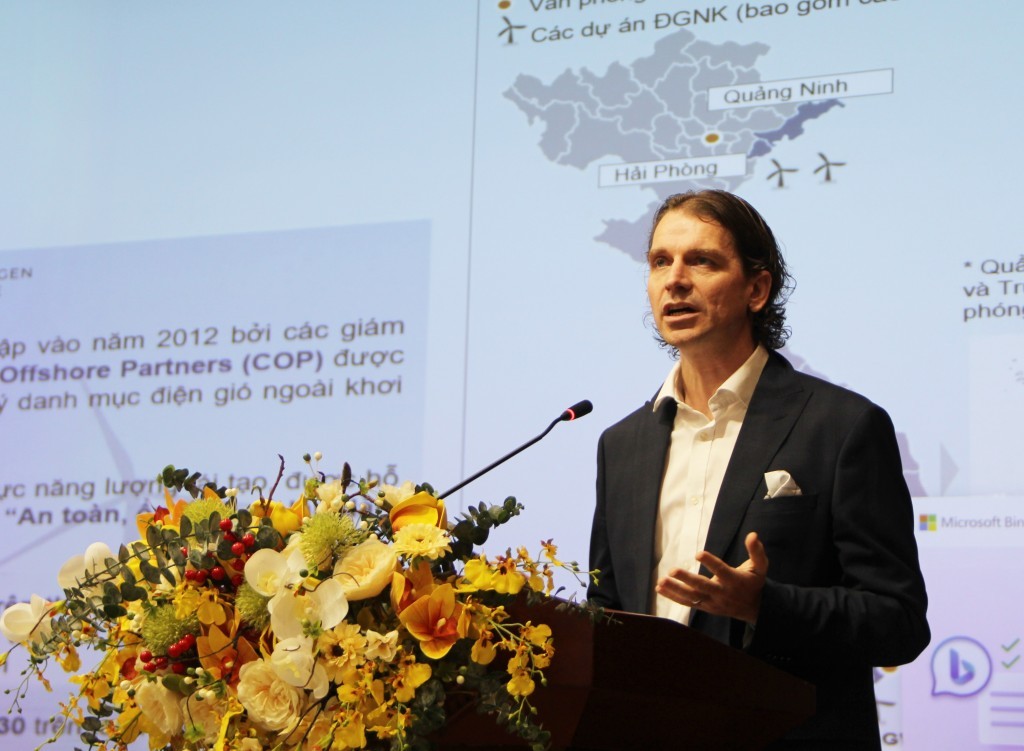 |
| Mr. Stuart Livesey - General Director of COP Vietnam and La Gan Wind Power gave a presentation on Challenges for foreign investors in starting offshore wind power projects in Vietnam |
Mr. Stuart Livesey - General Director of Vietnam COP and La Gan Wind Power introduced the Group's parent company, Copenhagen Infrastructure Partners (CIP), an experienced offshore wind power developer worldwide.
Vietnam is a country with perfect wind potential. It has up to 260 GW of offshore wind power projects (only for wind power with fixed foundations in shallow water).
The target of PDP VIII to have 6 GW of offshore wind power (excluding export projects) by 2030 is quite ambitious. To do that, in the implementation plan for deploying PDP, it is necessary to determine the capacity, location and time of the projects selected for development. Vietnam needs to have an appropriate plan to lease the seabed and allow exclusive development in that location. On the other hand, it is necessary to have a reasonable electricity purchase price, and transparent agreement, because an offshore wind power project requires large capital, so it must have a long-term guarantee from a bank.
According to the experience of Vietnam COP Company and the La Gan Wind Power project, it takes 2-3 years to survey an offshore wind power project. From survey to project, commissioning takes 6-7 years. As for the economic efficiency of offshore wind power, the minimum capacity of a project must reach 500 MW, the project will be effective.
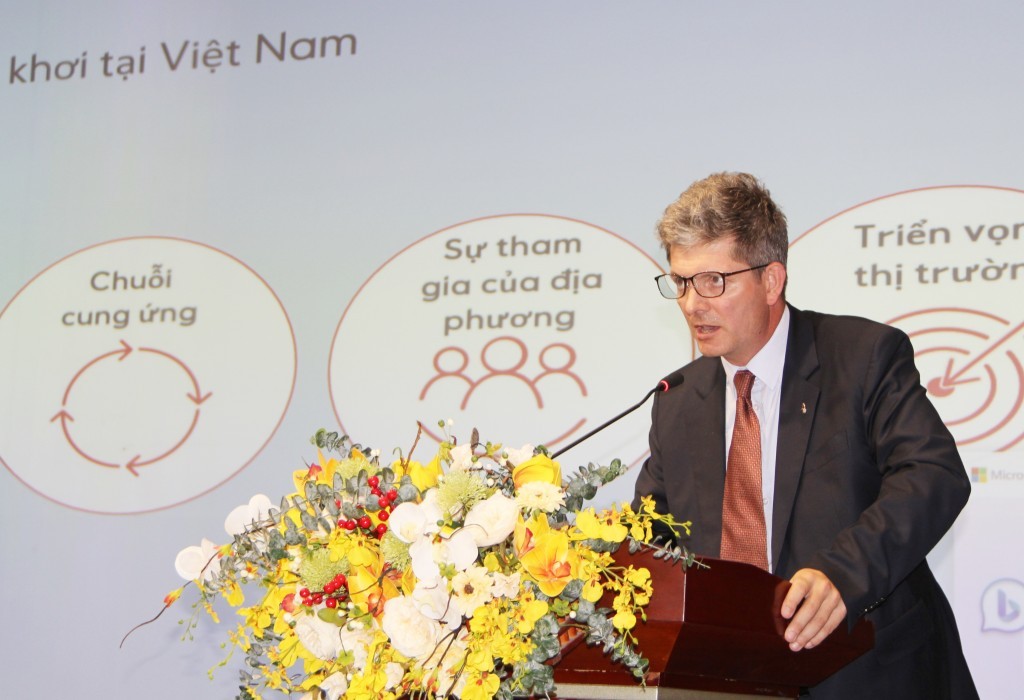 |
| Mr. Jacques-Etienne Michel - Country Representative of Equinor Vietnam gave a presentation on Proposing mechanisms and policies for offshore wind power project development in Vietnam |
As a foreign investor, Equinor Company from Norway with 5 decades of experience in wind power development has made recommendations for the development policy of offshore wind power projects in Vietnam in order to achieve the objectives for the country in 2030 stated in PDP VIII. The Equinor said that The prior projects should be shared for state-owned enterprises of about 2-3 GW, plus power export. The remaining 3-4 GW need to be considered as pilot projects and select the most suitable qualified and experienced developers. In the long term, regulations related to offshore wind projects will gradually improve based on the experience gained from the pilots.
According to Mr. Jacques-Etienne Michel – A director and Country Representative of Vietnam Equinor, developing an offshore wind power project takes 7-10 years, with many risks for investors. Therefore, there is a need for marine spatial planning. After that, it is necessary to assign the exclusive survey area to investors by the pilot mechanism.
The investor may be responsible for the transmission of the offshore part, but for the onshore part, EVN must ensure the connection on time. Along with that, the issue of the electricity purchase price must be transparent from the beginning, together with the committed output so that the power purchase agreement can be accepted by banks for loans. Equinor is willing to work with potential partners in Vietnam to develop the local supply chain.
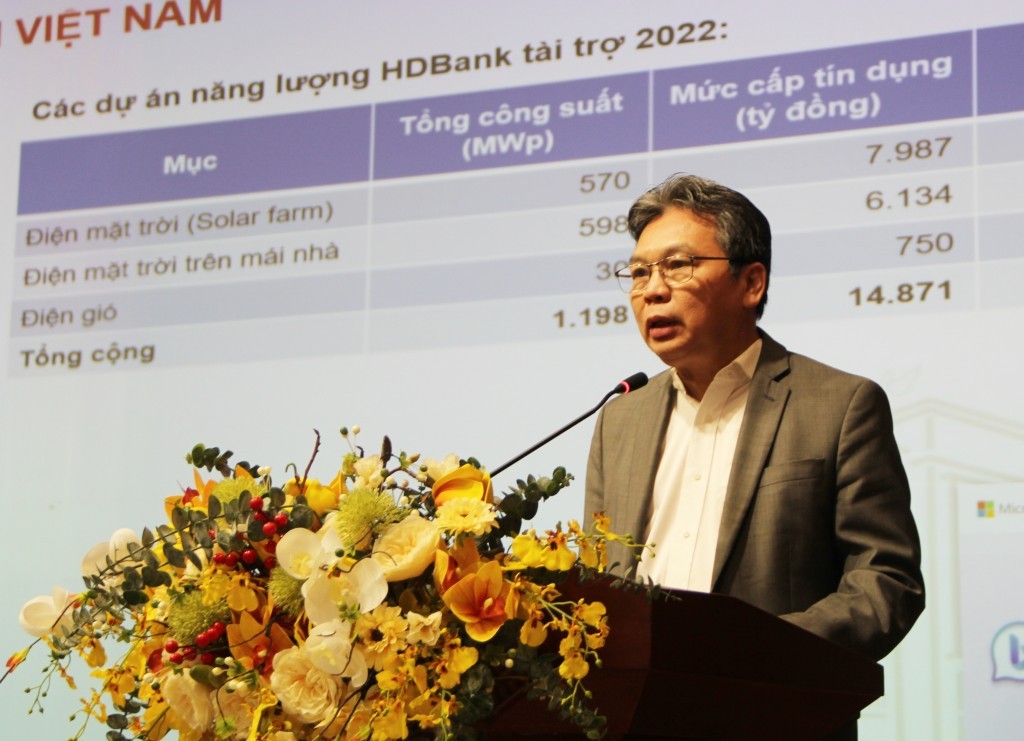 |
| Mr. Tran Hoai Phuong - Head of the Corporate Banking Division (HDBank) gave a presentation on Financing for energy projects in Vietnam - Removing difficulties for investors |
Mr. Tran Hoai Phuong – A director of the Enterprise Division (Ho Chi Minh City Development Commercial Joint Stock Bank - HDBank) introduced a green credit package with capital from international funds for renewable energy development (solar and wind power) These capital sources from HD Bank have helped develop 1,198 MW of renewable energy for Vietnam's power system.
However, the pricing mechanism for renewable energy is not long-term and consistent, while exchange rate risks always exist. The renewable energy loan is long-term for 8-12 years to payback. But currently, the standards for installing rooftop solar power projects are not available. The existing standards on renewable energy have a gap compared with the standards of international donors - the owners of green credit capital.
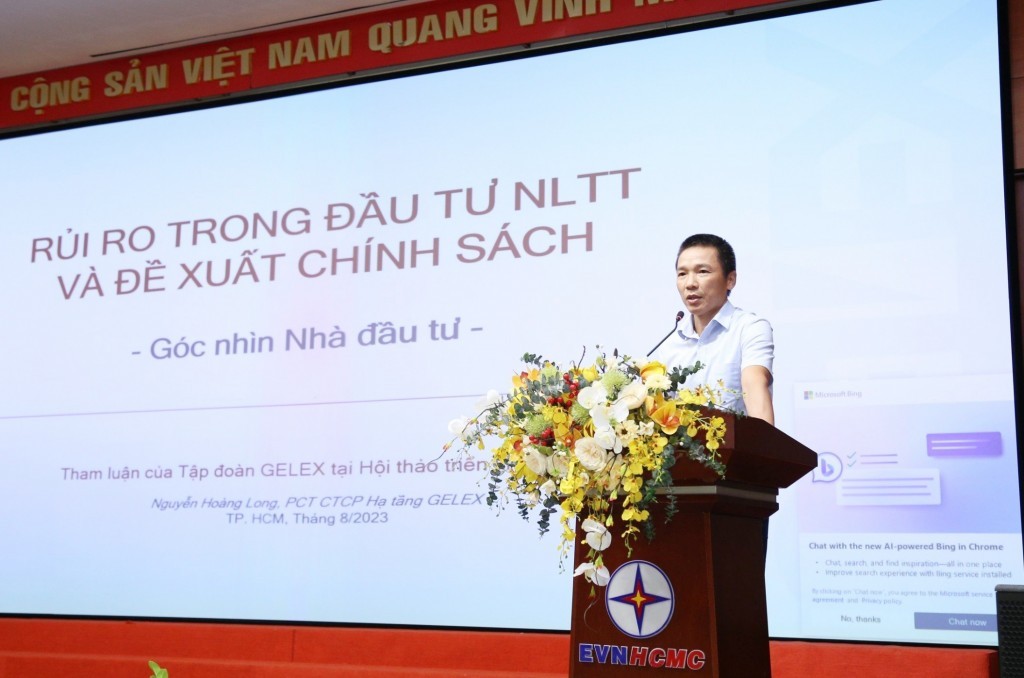 |
| Mr. Nguyen Hoang Long - Vice Chairman of GELEX Infrastructure Joint Stock Company (GELEX Group) gave a presentation on Risks in renewable energy investment and propose policies |
In the presentation "Risks in renewable energy investment and policy recommendations, from the perspective of investors", Mr. Nguyen Hoang Long - Vice Chairman of GELEX Joint-stock infrastructure Company expressed sympathy with the policy makers for the previous presentations with too many challenges and pressures in implementing PDP VIII, that requires to correct the policies and to balance many set requirements and priorities. But from the perspective of investors (the whole industry), GELEX considers that it is still necessary to recognize the fact that investors, in general, are failing and suffering great losses, with a total FIT slippage capacity of 4.7 GW, with nearly 8 billion USD of total investment spent with no chance of payback. Even the projects that have achieved COD (especially wind power projects) have low efficiency with many problems, and they are not easy to be profitable with FIT prices. Therefore, GELEX believes that if the policies in the coming time will not create opportunities for investors to make profits and balance between risks and profits, it will be difficult to attract investors to participate, especially investors with strict and methodical management.
The GELEX representative also emphasized on the policy proposal, it is extremely important to introduce a pricing mechanism with a roadmap (instead of a hard deadline and no subsequent scenario). This helps investors, banks and other stakeholders to make informed decisions, with scenarios/plans suitable to their ability and risk appetite instead of just taking risks. This is especially necessary for large projects that need international capital. In addition, there should be regulations on responsibility and risk sharing from the authorities (such as in site clearance, procedures, transmission issues...).
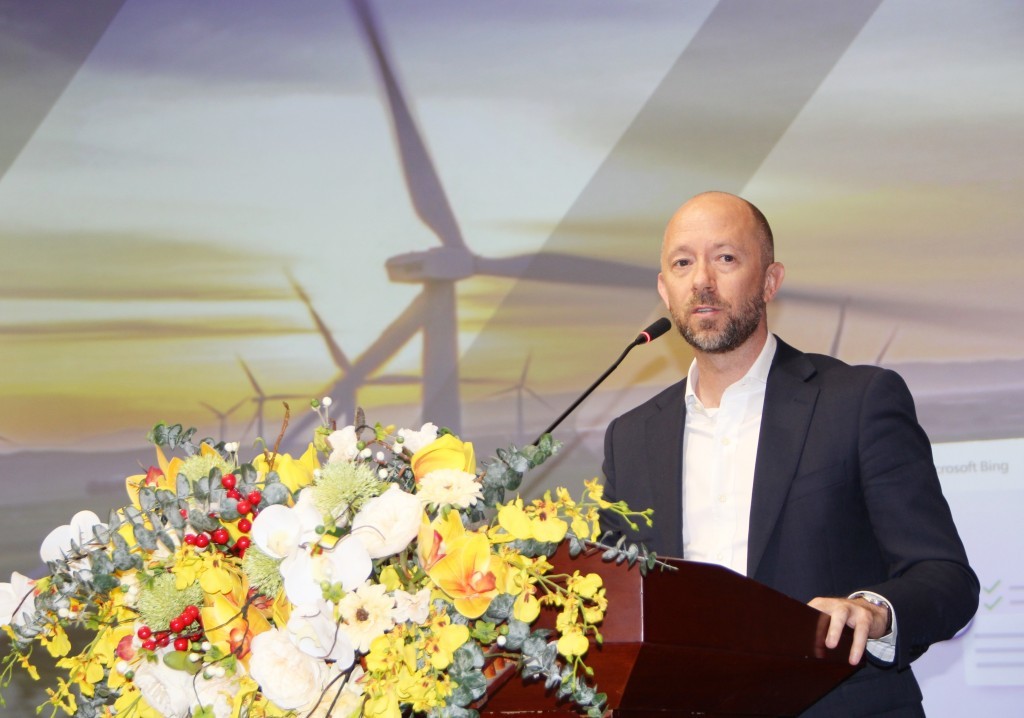 |
| Mr. Koben Calhoun - Regional Director of Southeast Asia (Rocky Mountain Institute - RMI) gave a presentation on Enhancing the flexibility of Vietnam's power system to integrate renewable energy |
Mr. Koben Calhoun - Regional Director of the Southeast Asia of USA Rocky Mountain Institute introduced the research and consulting activities of the Institute in the world. Rocky Mountain would like to share some experiences in increasing the flexibility of the power system to support the integration of RE and the opportunity to develop flexible plants.
According to Mr. Koben Calhoun, to increase the flexibility of the system is not only having the flexible plants but it includes 4 items that need to upgrade the flexible power plants, transmission grid, demand management and system operation. In demand management, Rocky Mountain introduced the illusive power plant (including the storage battery system, electric vehicle system, smart heat supply system and grid connection), which could store electricity or flexible time of electricity use. Vietnam can search and select the package of solutions for increasing flexibility of the system suitable with the power system with the lowest price in the market.
The discussion was lively, with the majority of opinions that, the target set by PDP VIII is reasonable for growth demand, but the implementation is very challenging. Without changes in mechanisms and policies, PDP VIII cannot be implemented. Therefore, it is necessary to clearly state that our system will follow the rules of the market for investors' peace of mind. And for that: Currently, the LNG negotiation process in Vietnam has no end, also because of market problems.
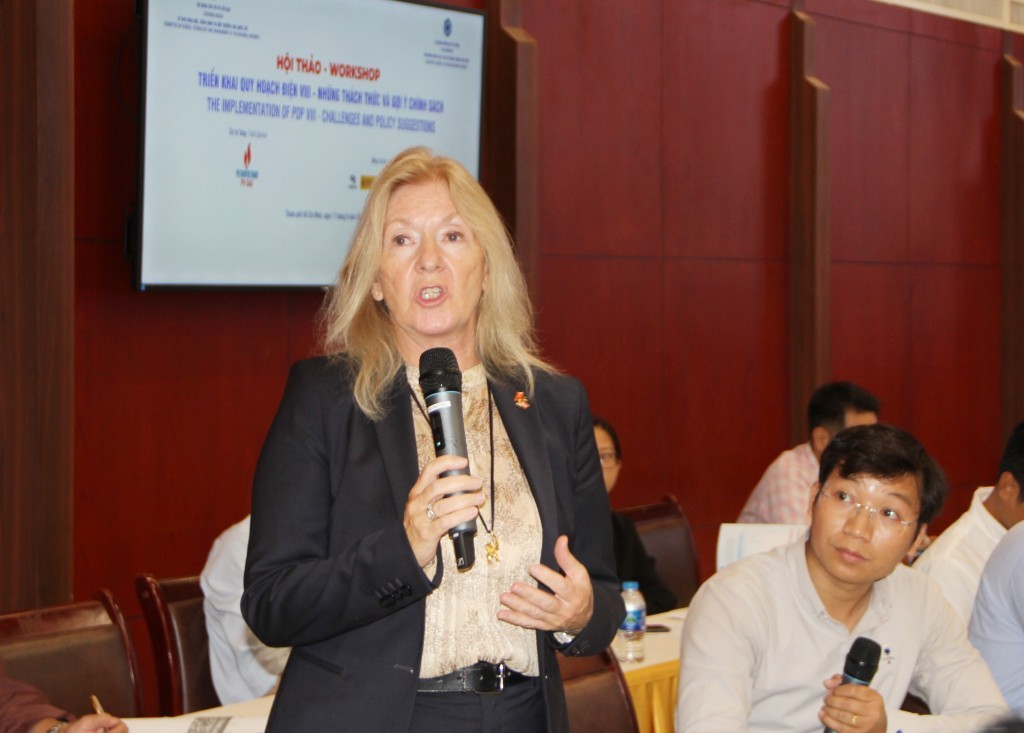 |
| Ms. Anita H. Holgersen - Senior Director of Business Development of Equinor in Vietnam speaks in the discussion session |
The investors are still waiting for marine spatial planning. Delegates suggested that it is necessary to boldly pilot before there is a permanent mechanism. In fact, around each substation project, whether there is a land auction or not, there are currently no clear guidelines.
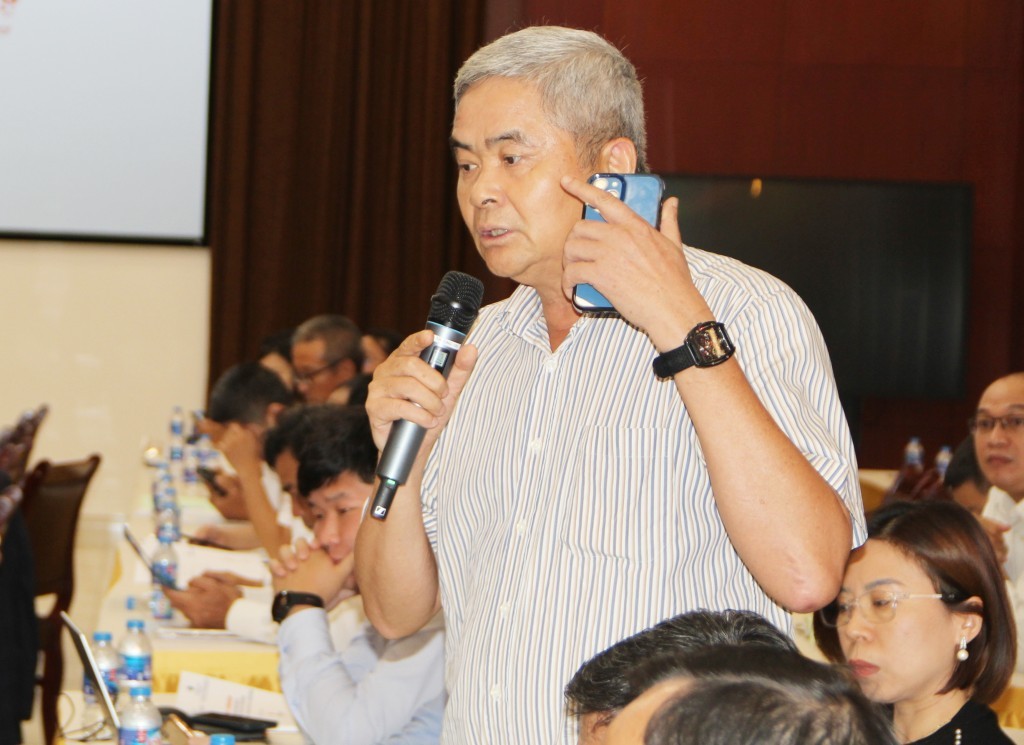 |
| Mr. Phan Xuan Duong - Energy expert speaks in the discussion session |
Does Vietnam want to achieve the targets of PDP VIII? If desired, offshore wind power projects must follow a trial mechanism, because time is not enough for the law to be completed before implementation. On the other hand, it is necessary to choose the right investors with the ability to implement. DPPA is a mandatory trend and needs to be accelerated.
Concluding the workshop, Mr. Ta Dinh Thi - Deputy Chairman of the Committee on Science, Technology and Environment of the National Assembly said that the National Assembly is revising many laws. The Land Law, which is expected to pass this October and we hope to better meet actual needs.
Regarding offshore wind power, even if we want to make a pilot, we need a decision from the National Assembly.
Renewable energy development is in the right direction towards Net Zero which Vietnam has committed. One thing must ensure the absorption and transmission capacity of the system. The huge demand for capital for PDP VIII from both domestic and foreign sources is also an issue that the National Assembly needs to discuss to find ways for opening the policies.
According to Mr. Ta Dinh Thi, the presentations proposed a lot of practical and detailed recommendations. The organizing committee of the workshop will summarize and include the documents of the National Assembly Oversight Team and remove difficulties and obstacles in implementing PDP VIII.


